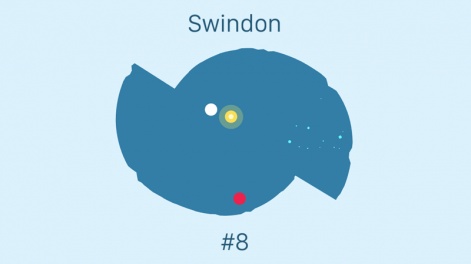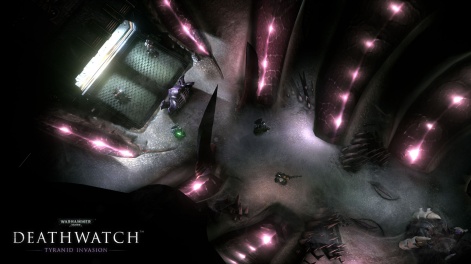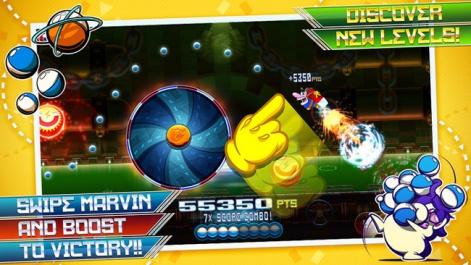No matter how you've gone indie, whether working purely on passion all by yourself, or having dropped out from a much larger studio to form your own smaller team, there's at least once constant: the struggle to keep focused.
Typically, the stricter professional culture of large game development houses means that there's always someone watching the clock for you, organising who's doing what, geeing everybody on by waving schedules in your face.
But, if you're indie, it's probably up to you to manage all that by yourself.
It can be tough, having to motivate yourself, no matter how much you love games.
And so, with this in mind, we checked in with our Indie Mavens to obtain some wise words on how to deal with this aspect of indie game development. This is the question we proffered them this week:
"How do you know when your game is ready to go live?
And what tools, techniques and tricks do you use to keep motivated during the final push?"

Jon's focus is on content, working from the initial outline, through the development of the authoring tools, to the writing and scripting of final content.
Previously, Jon was a lead designer at Sony Computer Entertainment Europe, and before that a secondary school teacher, so he loves to talk. He's a published author of short stories and over a decade's worth of award-winning interactive fiction.
You know a game is ready to ship when you can't stand it any more; when every element that was once fun and entertaining seems tired and under-worked. When the whole experience feels minor, cheap and like a waste of time - that means you should fix the bugs and move on, because anything else you do will only make it worse.
Motivation can be hard! We tend to leave a lot of the "safe" gloss for last, because nothing cheers you up more than, say, the day audio goes into the game.
It doesn't take long to do, but it brings everything to life.
Testers are also great for keeping up your spirits because - with any luck - they like the game a whole lot more than you do!
My games never feel ready to go live, eventually one day I just decide I'm approaching diminishing returns on the levels of polish that I still want to do.
If I waited until it was fully ready in my head I'd probably have wasted another year on stuff no one cares about but me.
The 60-80% mark is where I really struggle.Richard Perrin
Though thankfully I find the final push to be the part where I struggle with motivation the least. The 60-80% mark is where I really struggle.
Once I'm over the hump and am just polishing an already finished playable game I'm super motivated because I'm not worried how long it will take to finish.
Instead I know every little change I'm doing is just making things better.
You have to set a very clear place where you want to be in terms of polish and absolutely stick to that.
One thing that is enormously important is to give yourself time to recharge.Paul Kilduff-Taylor
You have to get good at identifying where polish will make a difference and where you're getting, as Richard put it perfectly, diminishing returns.
There's no greater motivation at that stage of a project than finally being able to leave it alone, so that's what usually causes the sprint to the finish!
One thing that is enormously important is to give yourself time to recharge when doing that push: if you have done several 7-day weeks in a row you absolutely need to give yourself an entire weekend off where you don't touch a computer or think about the project at all.
It's vital for the health of your body, mind and relationships!
We just shipped our newest game, Finger Derpy for iOS so this is pretty fresh for me. Of course all the key features are in, all the bugs are out. So, you're ready to send it out.
Now give it a month: Walk away, don't play it for a few days, then start playing it all the way through like a regular person.
Slowly over time, plenty of little nigglies will come out that need fixing. After all those are fixed, it's ready.
Tools? To Do lists for sanity, broken up along days for scheduling. Get sleep, don't go crunch-crazy thinking you'll finish the game *tonight*! Oh and get some exercise too.
Out of the 5 games I have worked on, I have only "shipped" one. My first game jam game, "the universe within..." was iterated on after the game jam based on feedback/bug testing and a few weeks of Saturday dev sessions and put on the App Store for free.
My 2nd game Glorious Ending Cinematic is sitting on the internet somewhere and failed to meet the MolyJam 2012 deadline because we had some must dos in order to feel comfortable uploading it.
My current big project Treachery in Beatdown City has been worked on for over 3 years now in part/full time. Still have months to go. I'm looking forward to launching it to backers to get a lot of community feedback.
I also worked on an Oculus game that I want to go back to (also a game jam game) and a physical/board/gallery game which I only "worked on" for a month or less - I keep iterating on rules when I show it off, and it's only been at 2 events.
So TL:DR - every project is different.
I could give some ideas about the final push for a procedurally generated game like Magic Shot to complement the other excellent points already made here.
The final push is for me about building a process to « test » the robustness of the procedure in every possible situation. Especially in a generated game that uses physics with a different game for each player, you have to make sure there’s no blocking situation. It means you have to create some model to generate the buggy situations. It’s not necessarily really complex.

For Magic Shot (a billiard game with morphing tables), I had to make sure no balls were trapped in position where you can’t win. So I made 2,700 screenshots of the game, and browsed them one by one.
I isolated the tricky ones, and added the very last needed behaviors to make sure the balls couldn’t be trapped (balls behavior rather than tables, because I can’t really re-eingineer the tables generators at that point without jeopardizing the whole thing).
Technically it’s the moment where I consider the game « finished » : when I’m confident it can’t be unplayable while retaining its playable qualities or its flow (first 10 tables and tutorial, learning curve to expert player, game rythme and surprises along the way).
After that, it’s really a decision we’re taking together with Arnaud. You need to be at that point where the game flows perfectly, where 95% of the people you show the game are hooked in some way or another.
We are actually releasing our fifth mobile game Tiltagon this Thursday. For us the game is "ready" when it has all the features and polish that would keep the player playing for more than once.
Marking tasks as completed feels awesome.Jyri Kilpelainen
Of course the game has to be also as bug-free as possible but more importantly you have to be prepared to react and update the game asap if problems or bugs are spotted.
Todo lists are a must. And the tasks have to be broken down to so small that you can complete them on a regular basis, preferably every day.
Marking tasks as completed feels awesome and gives that little push to keep going. Sleep, fresh air and spending some time with the family is also important.
For me, it seemed like I could've kept working on my game forever. It's pretty hard to stop polishing, because as the dude who has spent the most time with the game, I see all its flaws and its potential to be "even better".
I wasn't sure how to stop/finish, but I eventually ran across some interview/talk with the advice to create a reachable finish line and cross it. Basically, decide what the minimum amount of things are your game needs to be "complete", get there, and release.
If you never release then it's not a game.Andrew Armstrong
(You can always come back after the release and add more and make the game "even better", but if you never release then it's not a game; a game is not a game if nobody is playing. MAKE GAMES.)
The last "10%" of the game takes 50% of the total time, and so it's really difficult to stay motivated when there's not near as much "progress" being made compared to the beginning of development.
The way I cope is by shutting off the part of my brain that looks for that visible progress and, instead, I create a Google Docs to-do list that I can knock out tasks from. Watching that list of boring to-dos get shorter feels goooood.
But really, I just listen to this on repeat until the game comes out.
Like any piece of artwork, a game is never finished - you just stop working on it. This is even truer with the trend of developers continuously updating their games with new content and features after release. So the question is: when are you ready to release?
A game is never finished - you just stop working on it.Andrew Sum
You should release your game when you are proud to tell people that you made it and when you know that players will engage with the core part of the experience in the way that you wanted them to. You know you've got this right when someone who is testing your game can't stop playing it.
As for motivation, it's the same problem as with any stage of the project. Except that now you can get excited to share what you've made with others!
As many here has already mentioned, you can always do more work on a game. You can always add a little shine to the polish. Obviously there has to be a point where you need to stop and decide that the game is ready for release.
I usually work with milestones to make this doable. In my case, if I don't have a deadline I'll spend way to much time tinkering with details that maybe 0.000001% would appreciate if they knew it was there.
Good feedback from players is a great way to cheer you and your team up.Pontus Lunden
I think it's important to make sure that the milestones aren't just arbitrary, though. It's easy to just push a milestone date that doesn't need to align with a certain date. For an example, I think it's good to put deadlines close to expos, so that we're forced to work with that date if we want the work done in the milestone to be in the version we send to the expo.
Of course, you'll need to be able to plan and especially prioritize your tasks if you work with strict deadlines. Otherwise you'll end up crunching, which is less than ideal.
As for motivation, I think in general good feedback from players is a great way to cheer you and your team up. These range from testers to press to expo goers. Seeing people enjoy your game always make it feel worth while. Also, if members of your team can't be present at expos or testing-days, be sure to tell them if something they've made got good feedback (So tell the composer if the music was well liked, tell an artist if a model they made looked good to the players etc.). It's a good way to make sure your team feels appreciated, which in and out of itself is a good motivator.
I like that the question already implies that the game is not finished but 'ready to go live'.
I delayed SwapQuest many times, as whenever the next release date approached I didn't feel the game represented the vision I had in mind completely.
Of course there were also many feature and todo lists that gave an indicator on how far I am in development. But in the end I think only a very polished experience will give you the satisfaction you want after releasing a game, so reserve some weeks or even months for that.
I keep myself motivated during that time by having check lists with small tasks on them. The more often I can tick off something, the better. Also, the fact that the release will be soon is already a great motivator, as you will finally get to say 'I did it, I released that game!'
Coming from someone who is gearing up to ship their first game, I feel like you know a game is ready to ship once you have a stable build of all the *necessary* features.
By necessary, I mean the "What could my game not exist without" features. What would make your game a very different or not as fulfilling experience.
We're pretty much going through this right now with Warhammer 40,000: Deathwatch.
There's a big old list of everything left to do in the game, which is divided into 5 tiers.
- Tier 1 is absolute. We totally need everything in that list to ship the game. Thankfully, that's not too far off being completed.
- Tier 2 is full of non-essential features and some important polish tasks.
- Tier 3 is more about polish.
- Tier 4, more and more polish, and
- Tier 5 is pretty much "wish list cool additional little things".
This whole list is tracked in an online software thingy called Pivotal Tracker, which is also what we use to plan sprints.
We have also set a date which is "Stop working on the list and ship it". This serves two purposes....
1). It gives us a target to aim for. Without this, you can meander about and lose focus. With a set date in mind, everyone can see the goal and really push for it. Knowing where the end is really helps motivation.
2). It enables us to plan financially. Knowing when a (hopefully) big chunk of money is coming into the studio allows us to plan for the future. Hiring more staff for the next game, etc.
As far as personal motivation goes. I spend time looking past this game and at the next one, and the one after that. Getting bogged down in the very near future will make you go mad... especially with all the pressure of launching a game.

It sounds a bit cheesy, but visualising past all that to the bigger picture helps keep me sane and focussed in the finalling months.
At Double Stallion we use JIRA pretty extensively. We use it throughout production, but when preparing for a release it becomes even more crucial.
Finishing a project is never easy, and it usually involves compromisesDan Menard
Any project that we work on typically goes through a "closing phase" which is the moment that we stop focusing on the high-concept vision and start looking at the here-and-now. The attitude is very much "What is stopping us from shipping this game right now!".
From there we build a list of issues in JIRA and start knocking things off.
Finishing a project is never easy, and it usually involves compromises if you want to stay on time and on budget.
Depending on the development resources you have, sometimes you don't have a choice. Going into "closing mode" is an important attitude shift for the team, and it usually comes when we feel that playtesting is showing really positive results, or time is simply running out.
We typically end a project with a (hopefully) clean QA run, so we don't have any glaring bugs at launch, and then we hope for the best.
We set goals we stick to for what we need to do before launching a game. Essential features in, everything we wanted to do with no show-stopping bugs. Without clear goals, that final part could drag on, and our games already take a long time to make.
A lot of what motivates us to get a game pushed out is that we don't have the means to polish it for a year.
We could probably afford it money-wise now, but you really need a dedicated support network from other developers to pull this off. Otherwise you're just adding extra penalties to the chance that you'll release your game and no one will care.
I worked on a side project on and off for roughly 5 years before eventually cancelling it.Chris Savory
Good question. I can't say I've ever actually looked at a game and said 'it's now ready to launch'. Lately I've been in a position where I can't financially continue and need the revenue from the game to fund another. I worked on a side project on and off for roughly 5 years before eventually cancelling it.
This was because without serious consequences to meet a deadline, I just can't finish anything and fall out of love with the game if it takes too long.
I guess you could say the technique I've used to break out of that was to quit my job and take on the incredibly stressful life of only earning money with my indie games.
Not a healthy choice by any means but I don't think I could have changed my attitude about finishing games without putting myself in this situation.
It's common to feel like your game is never finished, there is always "just one more" feature to be added, and it's easy for that thought process spiral out of control. This is especially true in the ever-changing world of mobile games, where the climate can shift at a moment's notice.
A way we combat this mentality is to set a simple scope consisting of the bare minimum feature set and polish the game needs to reach a standard that we can deem "store ready".

We will also put together a list of features we'd like to see in the game that aren't essential to its launch (extra modes, leaderboards, animations, etc.), and if we get a game to the store ready state ahead of schedule it's a bonus to be able to get some more features in. If we don't get the extra features in, they can always be added later.
The single most important way to know your game is ready to go live is if you can hand it to a stranger and they are able to play it from start to finish effortlessly and without your intervention.Greg Dawson
The single most important way to know your game is ready to go live is if you can hand it to a stranger and they are able to play it from start to finish effortlessly and without your intervention.
If they are getting hung up on glitches and broken level design, or you are having to walk them through anything, it's probably time to go back and re-evaluate those aspects before you launch.
If just a few people having trouble in your play testing, just imagine how many people are going to run into the issues once the game's live. It took us many months the get the training level in Major Magnet tweaked so players were able to learn how to play the game of their own accord, and in that case we didn't release the game until we were positive the majority of players would at least complete that part.
Todo lists and collaborative tools such as Trello have been a windfall during the final push, not only to keep people on task but also for your own sanity.
It can be daunting thinking of all the little things that are still left to do, but if you're able to check things off one by one you'll feel a sense of accomplishment that will keep you going until the end. It may seem obvious, but a healthy regimen of diet, sleep, and exercise is essential all the time, but especially during that final push.
If you're going 24 hours on no sleep, and you're so in the zone you've forgotten to eat all day, you are going to make mistakes, your brain just isn't working at full capacity. When you are at a critical time such as a game launch, it's not the time to be making mistakes.
A game launch is a scary and exhilarating thing. The game has spend so much behind closed doors and now it's going to be seen and scrutinized by the world. It's your baby, you've seen it since its conception and watched it grow up, but any good parent knows when it's time to let their baby stand on their own two feet.
[people id="595" name="Niels Monshouwer"]
It is always a struggle between making your game better and time/budget.
By focussing on the most important features and fun at the beginning, in the end the discussion is (almost) always about polish. So the decision of leaving something in or out is never critical. Our process works as follows...
My job is to stay on time and budget, other people in my team have to make the best game possible.
So when nearing the end of development we get discussions where they try to convince to stretch the deadline to get more fun stuff in the game.
I then ask myself the question, how many more sales will this additional development give us? When it really improves quality, fun or content it is often worth it.
Closer to the end I start asking this question to the team as well, that's when the game is done.
Never. My games are never ready - there are always many things to add or to change. There are always a few (or more) things to fix.
But, I have to release a more (or less) stable version - to pay the bills.
My longest strike is the Red Storm series. I've released 8 of them - each new is fixed and expanded previous version.








































